My Double Donation Story: Rebekah Thomas
I am a double living donor. I donated my liver in July 2019 and my kidney in September 2020.
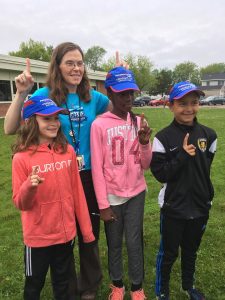
I am an elementary school teacher, and many years ago there was a student we had in first and second grade who started getting pretty sick. She missed a lot of school due to having kidney and liver disease. As a school community, we did a lot of fundraisers to support her family with her medical expenses. In middle school, she had to be hospitalized for an extended period of time because she was so sick. She ended up getting a liver transplanted from her father and a kidney from a close family friend.
During that process, I started thinking about what I would do if they had asked the community to consider being her living donor. I wondered if I would be willing to be tested, and decided that yes, I would be willing to step forward if asked. I sat with that realization for many years.
Shortly before I turned 45, I decided that it was a good time: I wanted to be a kidney donor for my 45th birthday. I didn’t have any idea how to go about it. I didn’t know anyone who needed a kidney, I didn’t know about our local transplant center or if we even had one. I called my local hospital, the University of Vermont Medical Center, and told them I was interested in being a donor. They transferred me to transplant services, and a nurse called me back and asked for the name of my intended recipient. I said, “I don’t have one, I just want to donate.”
I had a phone call with the transplant coordinator there and made an appointment to do the initial information session to make sure I really understood the process. I started the evaluations on September 25, 2019: my 45th birthday. During that appointment, we set the donation date: December 18, 2018. I thought that this would be a great Christmas present for someone, and I was excited that the process had begun. Throughout October, I would have an appointment or two every week. This allowed me to have time to really think about my decision.
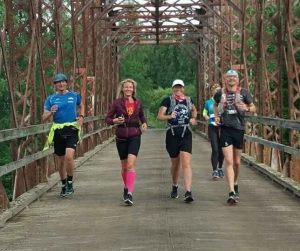
Everything was going well until my last full-day appointment, when I had the CT scan and met with the nutritionist and the remaining people from the transplant team that I hadn’t met yet. When I came out of the CT scan, I had a sinking feeling, and I started crying. I just had a feeling they were going to say no.
I went back to my transplant coordinator’s office, still in tears. She checked the results of my scans and said she needed to consult with the surgeon. She came back and told me that unfortunately I was not a candidate because I had multiple arteries on both of my kidneys. This could pose a risk to both the donor and the recipient, and their policy was that they wouldn’t perform the surgery if there were any additional risks.
I was devastated, which was interesting to me because I didn’t know how I would react if they said no. I held no ill will toward them, though. They were following their protocols, and I appreciated that they were putting my safety and the safety of my recipient at the forefront.
After meeting and discussing my situation with other members of the transplant team, I asked if I could get a second opinion, and they agreed. They sent my records to Dartmouth Hitchcock and Mayo Clinic Rochester. In the meantime, I made a coffee date with the mom of my former student. I called her out of the blue and said, “Can we meet to talk about transplants?” She said, “I would love that!”
We met and I explained everything that happened, and she asked if I had ever considered donating part of my liver. I had considered it, but my transplant coordinator had discouraged me because it seemed like I hadn’t really given it enough thought. She said, “Well, I’m not going to push you, but you might want to think about the University of Pittsburgh Medical Center (UPMC) (which is where her daughter had gone) because they are one of the leading hospitals for liver transplants.”
I did some research and then I reached out to them and asked if they would consider me as a donor. They asked if I meant kidney or liver, and I asked if it was possible to do both.
I made an appointment to go there in person in February 2019 for a full day of testing and evaluation. They asked if I had a preference for donating a kidney or a lobe of my liver, and I said I would like to do both if I could. They recommended donating the liver first because it’s a more complex surgery. If everything went well with the liver donation, I would probably be a good candidate to donate a kidney.
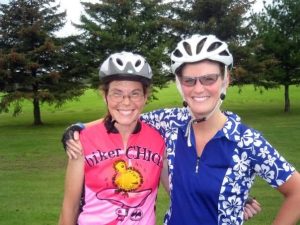
Pittsburgh ultimately accepted me as a donor. In the meantime, Mayo and Dartmouth had also approved me, but Pittsburgh felt like the right place for me. The surgeon who performed my liver surgery was the same one who did the surgery for my former student’s father’s liver donation, and my transplant coordinator had been her dialysis nurse. It just seemed like I had found where I was supposed to be.
I was able to choose when I wanted to donate. Being a schoolteacher, I said I would prefer the summer, so I would have time to recover and wouldn’t have to take so much time off. I donated my liver in July 2019 to a woman with several health issues. I was able to meet with her about a week after the surgery. They typically ask people to wait three months before meeting the recipient, but I had stayed in Pittsburgh to recover after the surgery. At a follow-up appointment, my surgeon told me that my recipient knew I was from out of town and would really like to meet me before I went back home. I met her and her daughter, which was pretty amazing. She was on a long, slow road to better health and was hopeful about her future for the first time in a long while. We are still in touch, mostly by text, and we exchange cards during the holidays.
At my one-year follow-up for my liver donation, I asked if I could also have my initial evaluation as a kidney donor, and I was ultimately approved. When given some options for a date for the surgery, I chose September 25, 2020: my 47th birthday.
I went back to UPMC for my kidney donation, and because they knew I had been fine with meeting my liver recipient, they asked how I felt about meeting my kidney recipient, because he had already decided before our surgeries that he really wanted to meet me.
I was grateful to have the opportunity once again, and I met him and his wife the day after my donation. It was very sweet. We spent about 45 minutes chatting. I was able to see them in Pittsburgh when I went in for follow-up appointments. After the transplant, he was able to return to work. He had five grandchildren at the time, and his goal was to keep up with them. He told me he is now able to chase them around the yard.
Fast forward a couple years, when I was at my final follow-up for my kidney donation and my surgeon said, “You would be proud of me, I’ve started running again!” I floated the idea that we should put together a living donor relay team for the Pittsburgh Marathon, including him, of course, and it actually came to fruition.
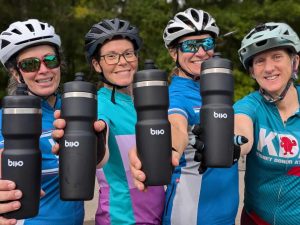
In 2023, we completed the marathon with three living donor relay teams, comprised of donors, transplant surgeons, recipients, and people from the transplant department. Everyone had such a great time that it has become an annual event. This year in May we had our third race and reunion. We’ve found that it’s such a positive way to raise awareness not only about the need for living donors but also about how active someone can be after donation.
I love being part of active advocacy. In 2022, I participated in the One Kidney Climb Kilimanjaro with Kidney Donor Athletes—22 living donors hiked to the rooftop of Africa, summiting on World Kidney Day, to demonstrate what is possible with one kidney. In 2024, I did a four-day, 444-mile bicycle ride with three other living donors to raise awareness for living kidney donation. This August, I plan to do the TransRockies Run, a six-day, 120-mile race in Colorado. It has been such a great opportunity to spread the word that you can accomplish physically challenging things after donation. Many of us in the Kidney Donor Athletes group are actually more active now than we were prior to donation.
I think what a lot of us have also found is that one of the unexpected perks of living organ donation is that your family increases: recipients often feel like family, and there is this family of living donors, who have this unique and pretty extraordinary thing in common.
Rebekah Thomas
I think what a lot of us have also found is that one of the unexpected perks of living organ donation is that your family increases: recipients often feel like family, and there is this family of living donors, who have this unique and pretty extraordinary thing in common. Just how much my own life has been enriched by being a donor is something I was not anticipating. When I embarked on the journey of living donation, I had hopes of improving the quality of life for my recipients; I had no idea that the quality of my own life would improve exponentially.
About the Author
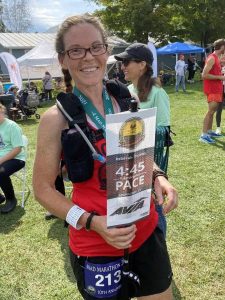
Rebekah Thomas is an elementary EL (English learner) teacher from northern Vermont. A native Vermonter, Rebekah completed her undergraduate degree in Russian and Russian area studies at Dickinson College in central PA. She then went on to complete her master’s degree in TESOL and bilingual/multicultural education at the School for International Training in Brattleboro, VT, followed by a master’s in curriculum and instruction at the University of Vermont in Burlington. She was not an athlete as a child but discovered a love of running while training for her first marathon in 2001. Since then, she has completed more than 125 marathons, in addition to several ultra distance events. These days, most of her marathons are completed as a pacer, and she continues to participate in trail races of all distances, from 5K to 100+ miles. Aside from running, Rebekah enjoys traveling (mostly for “racecations”), photography, hiking, cycling, and giving back to the community. She is a long-time mentor for First Strides Vermont, a beginning walking and running program for women. She is also an active member of the Vermont City Marathon race committee, where she focuses her energy on youth running events. She continues to donate platelets and plasma regularly at the American Red Cross, a commitment that began during her undergraduate days. Rebekah enjoys her role as a mentor to other potential living donors and finds that participation in a wide variety of athletic events is a great way for people to see firsthand that donation does not diminish one’s ability to remain active and enjoy sports for many years after donating.
